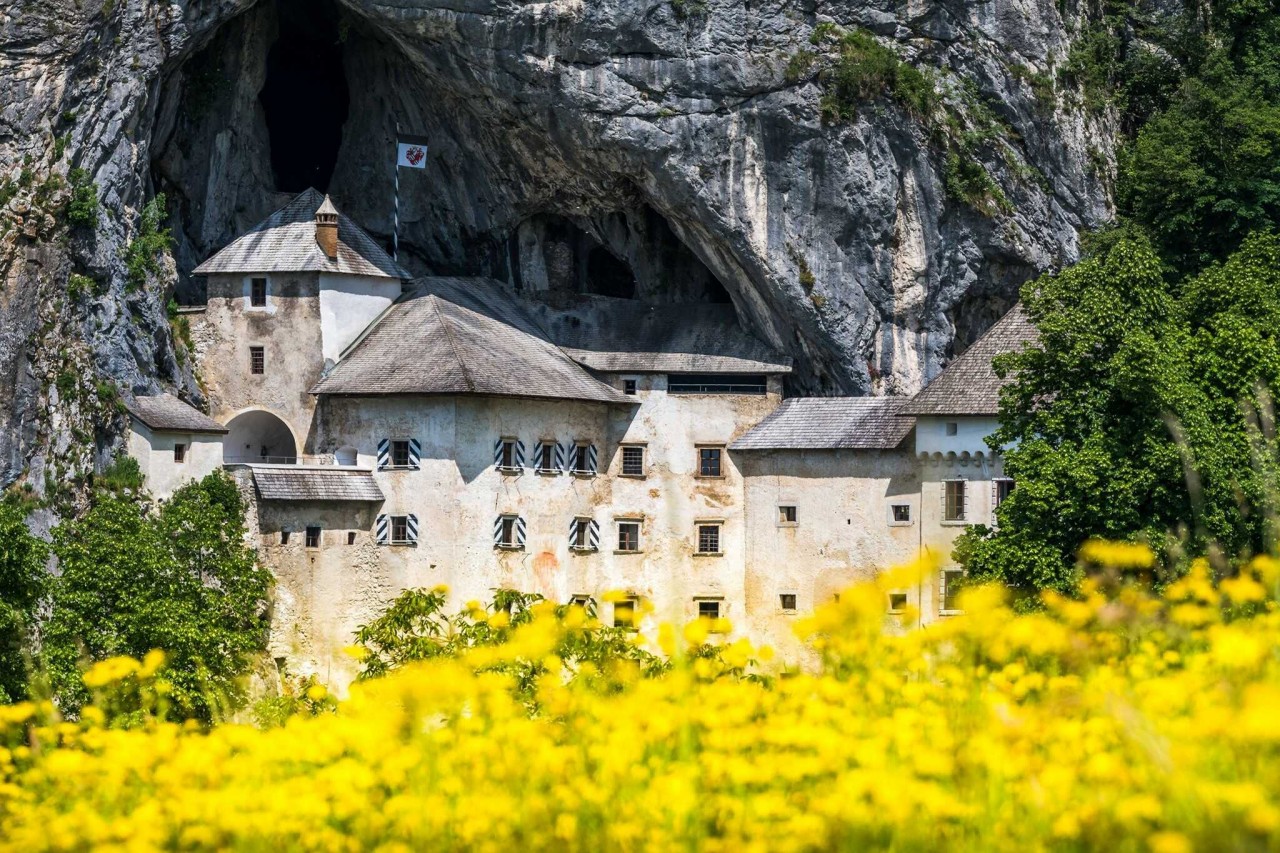 |
| Photo: In Your Pocket |
Predjama Castle, 9km from Postojna, is one of Europe’s most dramatic castles. It teaches a clear lesson: if you want to build an impregnable fortification, put it in the gaping mouth of a cavern halfway up a 123m cliff. Its four stories were built piecemeal over the years from 1202, but most of what you see today is from the 16th century. It looks simply unconquerable.
Predjama Castle is a Renaissance castle built within a cave mouth in south-central Slovenia, in the historical region of Inner Carniola. It is located in the village of Predjama, approximately 11 kilometres from the town of Postojna and 9 kilometres from Postojna Cave.
History of the castle
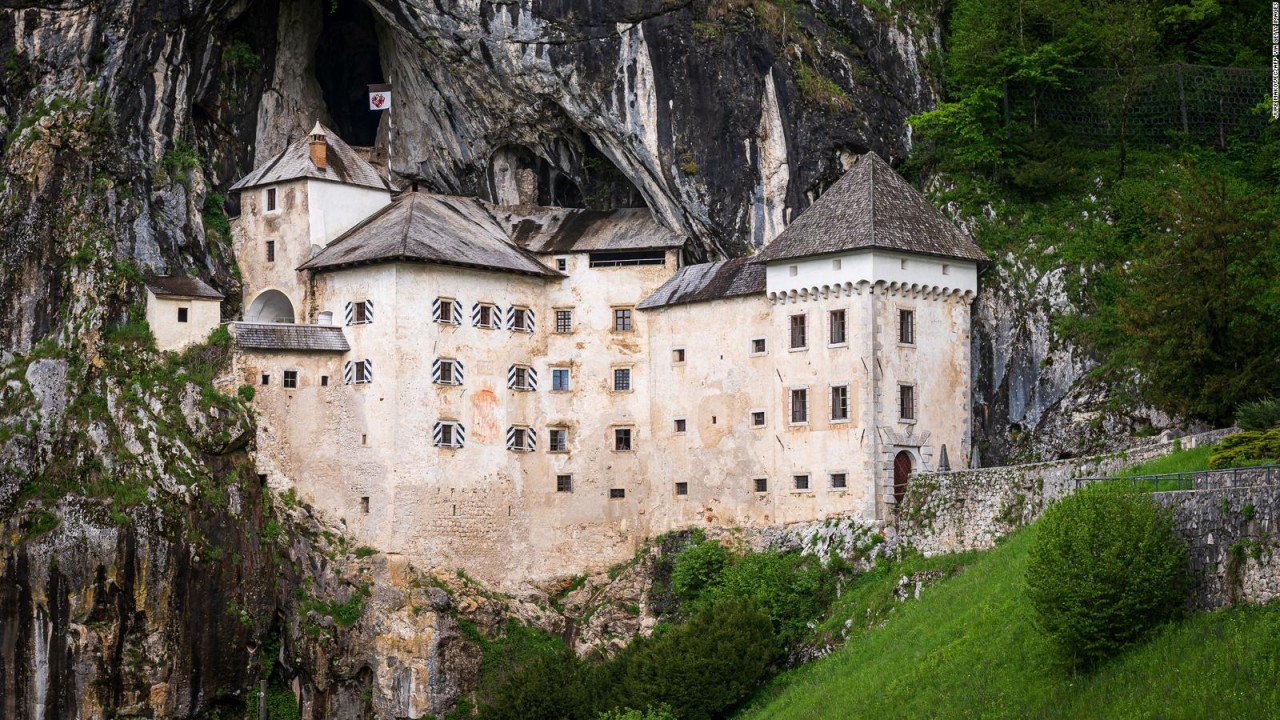 |
| Photo: Getty Images |
The castle was first mentioned in 1274 with the German name Luegg, when the Patriarch of Aquileia built the castle in Gothic style. The castle was built under a natural rocky arch high in the stone wall to make access to it difficult. It was later acquired and expanded by the Luegg noble family, also known as the Knights of Adelsberg (the German name of Postojna).
Legend of Erasmus of Lueg
The castle became known as the seat of the knight Erasmus of Lueg (or Luegg, Luegger), lord of the castle in the 15th century and a renowned robber baron. He was the son of the imperial governor of Trieste, Nikolaj Lueger.
According to legend, Erasmus came into conflict with the Habsburgs when he killed the commander of the imperial army, Marshal Pappenheim, who had offended the honour of Erasmus’s deceased friend and famous condottiere Andrej Baumkircher of Vipava. Fleeing the vengeance of the Holy Roman Emperor Frederick III, Erasmus reached the family fortress of Predjama. From there, he allied himself with King Matthias Corvinus and began to attack Habsburg estates and towns in Carniola. The emperor commissioned the governor of Trieste, Andrej Ravbar, with the capture or killing of Erasmus. Erasmus was killed after a long siege. According to a popular but unfounded legend, Erasmus was betrayed by one of his men and was killed by a shot from a cannon in his lavatory.
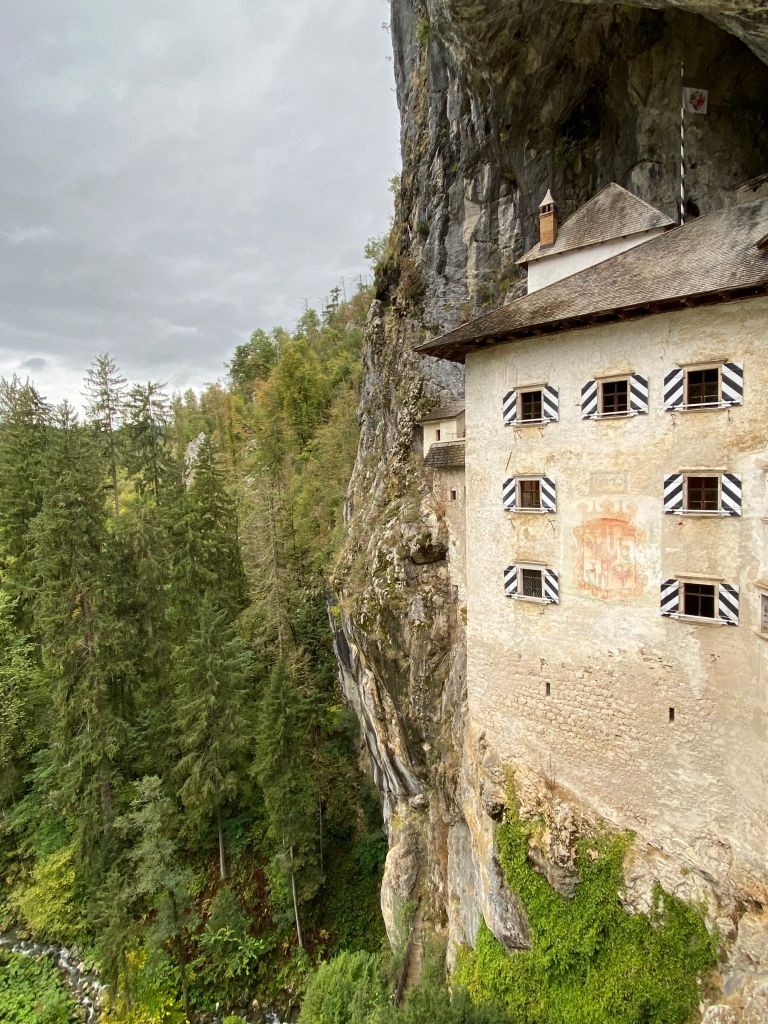 |
| Photo: Mike & David’s Adventures |
After the reconstruction
After the siege and destruction of the original castle, its ruins were acquired by the Oberburg family. In 1511, the second castle, built by the Purgstall family in the first decade of the 16th century, was destroyed in an earthquake. In the year 1567, Archduke Charles of Austria leased the castle to Baron Philipp von Cobenzl, who paid it off after 20 years. In 1570, the current castle was built in the Renaissance style, pressed next to a vertical cliff under the original Medieval fortification. The castle has remained in this form, virtually unchanged, to the present day.
In the 18th century, it became one of the favourite summer residences of the Cobenzl family. Both the Austrian statesman and famous art collector Philipp von Cobenzl and the diplomat Count Ludwig von Cobenzl spent time in the castle.
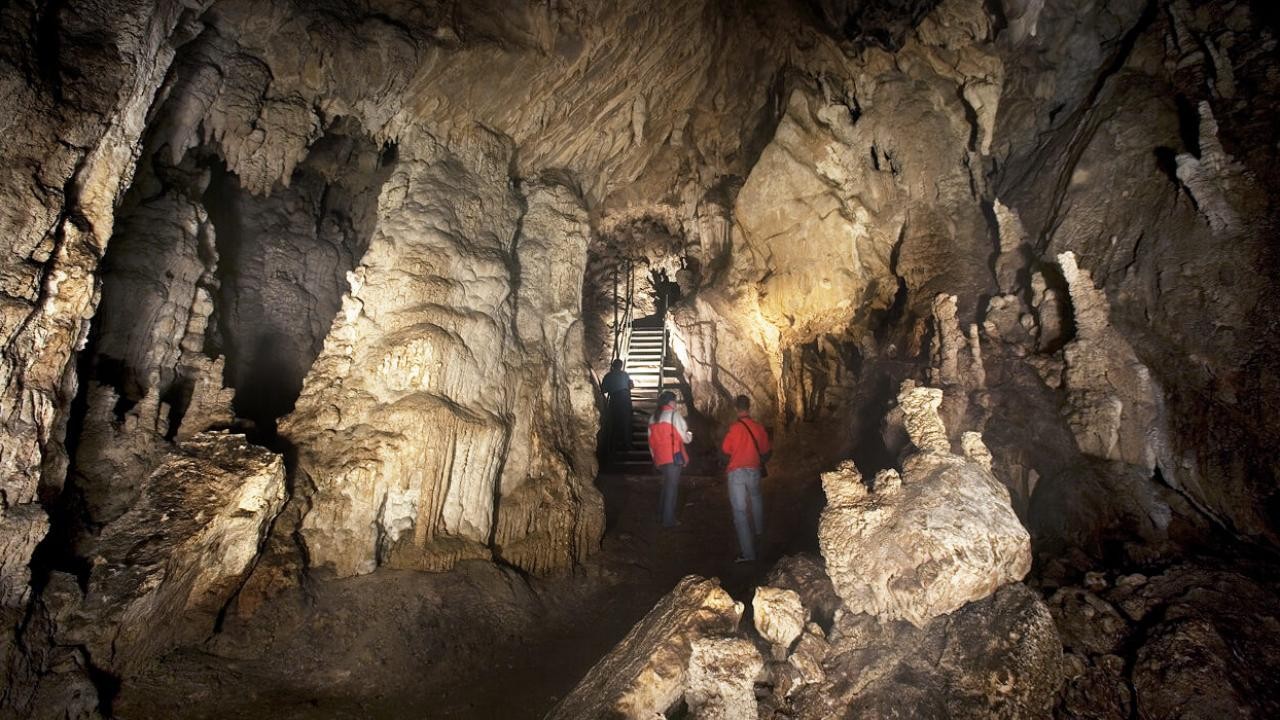 |
| Photo: Postojna Cave Park |
In 1810, the castle was inherited by Count Michael Coronini von Cronberg, and in 1846 it was sold to the Windischgrätz family, who remained its owners until the end of World War II, when it was confiscated and nationalized by the Yugoslav Communist authorities and turned into a museum.
A World-Famous Cave Castle
Natural elements seamlessly interwoven with manmade ones, the result of man’s work and nature’s creativity has created a pearl of medieval resourcefulness. The world’s largest cave castle, listed as one of the Guinness World Records, tells a picturesque story about the times when comfort had to give way to safety, and when the clatter of weapons would often drown out troubadours’ songs. It is so special and unique, it ranks among the ten most fascinating castles in the world, and so romantic that many couples choose it for their wedding vows.
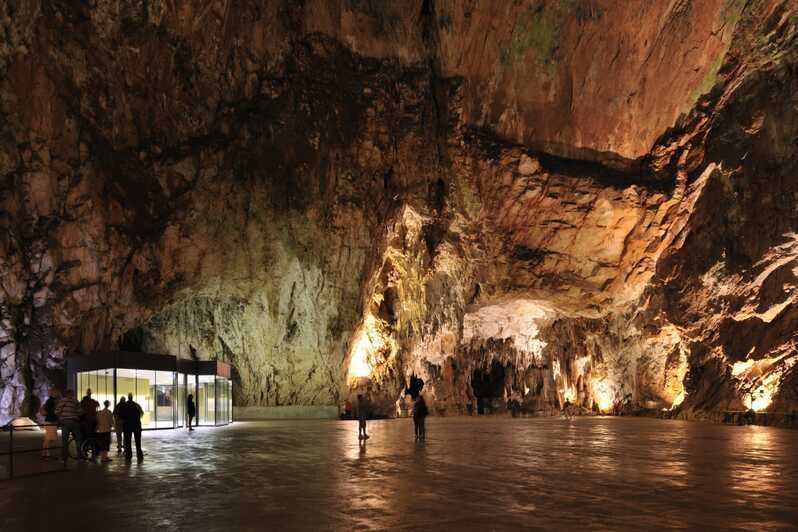 |
| Photo: GetYourGuide |
The Cave under Predjama Castle is the second longest Slovenian show cave spreading over four floors, which are all interconnected except for Erazem’s Hole and Erazem’s Passage on the top floor. The total length of all the cave parts discovered so far is 14 kilometres. The tourist section is 700 metres long and includes the Stables, the Main Passage, the Cave of Names, the Great Hall, and Fiženca, where the exit to the surface is located.
The cave below the castle is part of the 14km Predjama cave system. It’s open to visitors from May to September (but closed in winter so as not to disturb its colony of bats during their hibernation). Another adventure option is to visit the narrow Erazem’s Passage, through which the besieged knight was connected with the outside world (some climbing skills are required for this). Tours need to be booked at least three days in advance; caving tours range in price from €24 to €80.
For Adrenaline Lovers
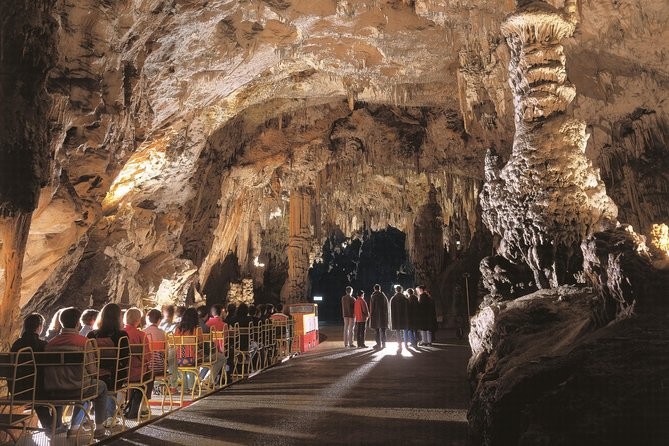 |
| Photo: Viator |
An excellent choice for more adventurous visitors is a tour of Erazem’s and Eastern Passages, as well as a guided walk to the Wind Hole.
Adventure tours are intended for all visitors who would like to visit the cave sections that are closed to regular cave tours, experience more challenging cave passages, break through water barriers, and follow in the footsteps of cave explorers. The tours take place in small groups, are accompanied by trained and experienced guides, and fall into three difficulty levels. The rental of caving equipment – if required – is included in the price.
Haunted or not, Predjama Castle truly is a superbly preserved relic that should be placed high on your bucket list when visiting Slovenia. The castle is open to visitors all-year-round, whereas its cave system is only open from June to August. An audio guide takes you through every part of the castle with excellent commentary.
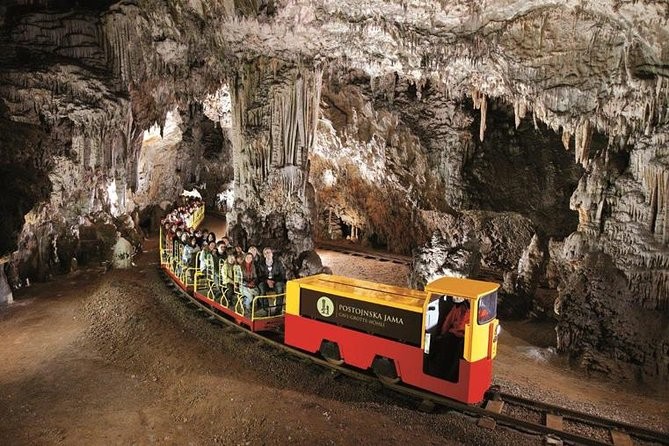 |
| Photo: Viator |
You get to experience what life in the Middle Ages looked like. There’s an armoury, a living quarter, servants’ residence, a chapel and even a dungeon with a torcher chamber. Every year, medieval games are held in front of the castle each year. Watching knights charge at each-other with the mighty fortress in the background is truly sight worth seeing.
The Second Longest Slovenian Show Cave
The Cave under Predjama Castle is the second longest Slovenian show cave spreading over four floors, which are all interconnected except for Erazem’s Hole and Erazem’s Passage on the top floor. The total length of all the cave parts discovered so far is 14 kilometres. The tourist section is 700 metres long and includes the Stables, the Main Passage, the Cave of Names, the Great Hall, and Fiženca, where the exit to the surface is located.
Unknown part of Paradise Cave
Thien Duong or Paradise Cave (belonging to Phong Nha Ke Bang National Park) has long been a popular tourist destination for visitors to Quang Binh province. However, most visitors only know the first 1km tour with wooden bridges and light, few people know that there is 7km behind the cave just for visitors who love the mysterious discovery.








